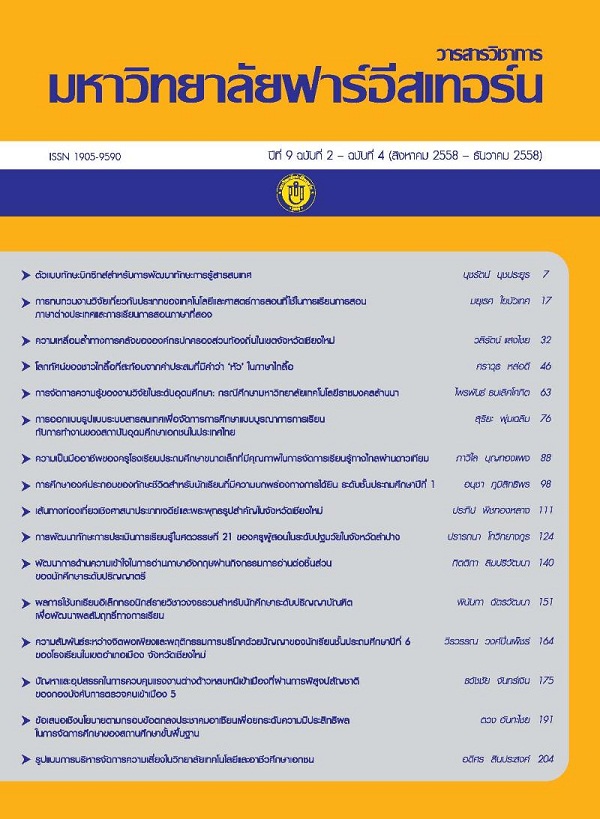ข้อเสนอเชิงนโยบายตามกรอบข้อตกลงประชาคมอาเซียนเพื่อยกระดับ ความมีประสิทธิผลในการจัดการศึกษาของสถานศึกษาขั้นพื้นฐาน
Main Article Content
Abstract
การวิจัยครั้งนี้มีวัตถุประสงค์เพื่อ (1) ศึกษาองค์ประกอบและตัวชี้วัดความมีประสิทธิผลในการจัดการศึกษา
ของสถานศึกษาขั้นพื้นฐานในประเทศไทย (2) ศึกษาสภาพปัจจุบันที่พึงประสงค์และวิธีการยกระดับ
ความมีประสิทธิผลในการจัดการศึกษาของสถานศึกษาขั้นพื้นฐานในประเทศไทย และ (3) พัฒนาข้อเสนอเชิงนโยบาย
ตามกรอบข้อตกลงประชาคมอาเซียนเพื่อยกระดับความมีประสิทธิผลในการจัดการศึกษาของสถานศึกษาขั้นพื้นฐาน
ในประเทศไทย วิธีการวิจัยเป็นแบบผสมผสานวิธี การวิจัยแบ่งเป็น 3 ระยะ ระยะที่ 1: ศึกษาองค์ประกอบและ
ตัวชี้วัดของการจัดการศึกษาอย่างมีประสิทธิผล เก็บรวบรวมข้อมูลจากเอกสารงานวิจัยที่เกี่ยวข้อง และการสัมภาษณ์
เชิงลึกผู้ทรงคุณวุฒิ จำนวน 7 คน ซึ่งได้มาจากการคัดเลือกแบบเจาะจง เพื่อนำมาจัดทำข้อเสนอเชิงนโยบายร่างที่ 1
ระยะที่ 2: ศึกษาสภาพปัจจุบันที่พึงประสงค์และวิธีการยกระดับความมีประสิทธิผลในการจัดการศึกษาของ
สถานศึกษาขั้นพื้นฐานในประเทศไทย โดยนำร่างข้อเสนอเชิงนโยบาย ร่างที่ 1 ไปสนทนากลุ่มกับผู้ทรงคุณวุฒิ
จำนวน 13 คน และใช้แบบสอบถามเพื่อเก็บข้อมูลจากผู้บริหารการศึกษาในระดับเขตพื้นที่ ผู้บริหารสถานศึกษา
และหัวหน้าครูวิชาการของสถานศึกษาขั้นพื้นฐาน จำนวน 421 แห่ง เพื่อนำมาจัดทำข้อเสนอเชิงนโยบายร่างที่ 2
ระยะที่ 3: การพัฒนาข้อเสนอเชิงนโยบาย โดยวิธีการประชุมอิงผู้เชี่ยวชาญ จำนวน 9 คน เพื่อพิจารณาความ
เป็นไปได้ ความเหมาะสม และความมีประโยชน์ของข้อเสนอเชิงนโยบาย ร่างที่ 2
ผลการการวิจัยได้ค้นพบยุทธศาสตร์การจัดการศึกษาขั้นพื้นฐานให้สอดคล้องกับข้อตกลงประชาคมอาเซียน
อย่างมีประสิทธิผลประกอบด้วย 6 ยุทธศาสตร์ 22 ตัวชี้วัด ดังนี้ ยุทธศาสตร์ที่ 1 การพัฒนาหลักสูตรและกระบวนการเรียน
เพื่อสร้างความตระหนักและการรับรู้ ค่านิยมในประชาธิปไตย การเคารพสิทธิมนุษยชนและการใฝ่สันติภาพ
มี 4 ตัวชี้วัด ยุทธศาสตร์ที่ 2 การสร้างความตระหนักในความเป็นพลเมืองประเทศสมาชิกประชาคมอาเซียน มี 2 ตัวชี้วัด
ยุทธศาสตร์ที่ 3 การปรับและพัฒนามาตรฐานด้านแรงงานและวิชาชีพ มี 3 ตัวชี้วัด ยุทธศาสตร์ที่ 4 การพัฒนา
ผู้เรียนให้มีทักษะในวิชาชีพและภาษาอาเซียน มี 4 ตัวชี้วัด ยุทธศาสตร์ที่ 5 การสร้างความตระหนักและการรับรู้
ในความสัมพันธ์และความหมายทางวัฒนธรรม มี 4 ตัวชี้วัด และยุทธศาสตร์ที่ 6 การพัฒนาสถานศึกษา
ให้ใช้งานวิจัยเป็นเครื่องมือในการพัฒนาผู้เรียน สร้างสังคมความรู้และการเรียนรู้ตลอดชีวิต มี 5 ตัวชี้วัด
The objectives of this study were to (1) study elements and indicators for enhance effectiveness
in education management of basic schools in Thailand; (2) study the current state desirable and study
the method to enhance effectiveness in education management of basic schools in Thailand; and (3)
develop the policy proposal according to Agreement of the ASEAN Community to enhance effectiveness
in education management of basic schools in Thailand. This was a mixed-method research. The research
process was divided into 3 phases; phase 1: study elements and indicators for enhance effectiveness in
education management. Data were collected from documents related research and in-depth interview
with 7 experts derived by means of purposive sampling; then prepare the first draft policy recommendations.
Phase 2: study the current state desirable and study the method to enhance effectiveness in education
management of basic schools in Thailand by take the first draft policy recommendations into focus group
with 13 experts and use questionnaires to collected data from educational administrator in educational
district level, school administrator and head of academic affairs teachers from 421 basic schools; then
prepare the second draft policy recommendations. Phase 3: develop the policy proposal, using connoisseurship
with 9 experts to examine feasibility, appropriateness and usefulness the policy recommendations.
This research is summarized that; policy recommendation includes strategies in effective education
management of basic schools according to Agreement of the ASEAN Community consist of 6 strategies;
22 indicators. The first strategy: developing curriculum and learning process for create awareness and
recognition of democratic values, respecting human right and pursuing peace; consist of 4 indicators.
The second strategy: creating awareness in the citizen of ASEAN member country; consist of 2 indicators.
The third strategy: adjustment and develop workforce and occupational standard; consist of 3 indicators.
The fourth strategy: developing student to have occupational and Asian languages skills; consist of 4
indicators. The fifth strategy: raising awareness and recognition of the relationship and cultural meanings;
consist of 4 indicators. The sixth strategy: development basic schools to have use research as a tool to
develop student and create a knowledge society and lifelong learning; consist of 5 indicators.
Article Details
1. Any views and comments in the Journal of Social Innovation and Lifelong Learning are the authors’ views. The editorial staff have not to agree with those views and it is not considered as the editorial’s responsibility.
2. The responsibility of content and draft check of each article belongs to each author. In case, there is any lawsuit about copyright infringement. It is considered as the authors’ sole responsibility.
3. The article copyright belonging to the authors and The Far Eastern University are copyrighted legally. Republication must be received direct permission from the authors and The Far Eastern University in written form.

